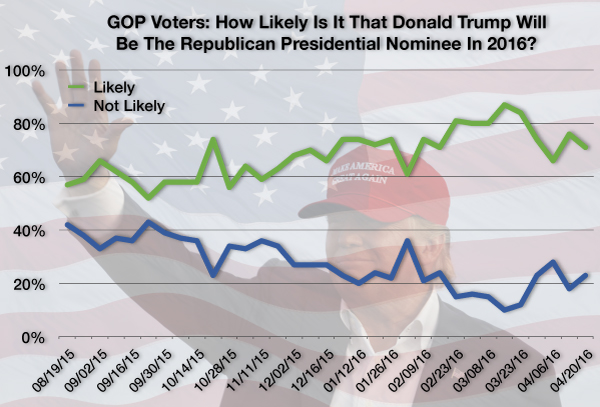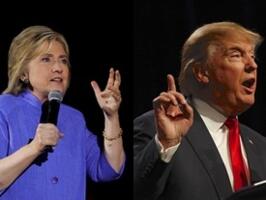Trump Change: Is ‘The Donald’ Back?
The Trump train appears to be back on track following his big win in Tuesday’s New York primary.
The latest Rasmussen Reports weekly Trump Change survey finds that 83% of Likely Republican Voters now believe Donald Trump is likely to be their party’s presidential nominee, up from 76% a week ago. Perhaps more significantly the latest finding includes 49% who say a Trump nomination is Very Likely, a view held by just 38% of Republicans last week. (To see survey question wording, click here.)
In mid-March, 87% of GOP voters said a Trump nomination was likely, with 59% who considered it Very Likely. Both were the highest weekly findings since Rasmussen Reports began the Trump Change survey last August. But after building for months, expectations of a Trump nomination began falling in the face of candidate gaffes, $70 million in anti-Trump advertising and his loss of the Wisconsin primary. That downward momentum stabilized a bit last week and now seems to have been reversed.
Among all likely voters, 71% see a Trump nomination as likely, with 39% who think it is Very Likely. Last week at this time, those findings stood at 67% and 30% respectively. In mid-March, a high of 46% said Trump was Very Likely to be the GOP nominee.
(More below)
Just 23% say Trump is not likely to win the nomination, with nine percent (9%) who say it’s Not At All Likely. Only 13% of Republicans feel Trump’s nomination is not very or Not At All Likely at this point.
(Want a free daily e-mail update ? If it's in the news, it's in our polls). Rasmussen Reports updates are also available on Twitter or Facebook.
The survey of 1,000 Likely U.S. Voters was conducted on April 19-20, 2016 by Rasmussen Reports. The margin of sampling error is +/- 3 percentage points with a 95% level of confidence. Field work for all Rasmussen Reports surveys is conducted by Pulse Opinion Research, LLC. See methodology.
Next Tuesday’s primaries in Pennsylvania, Connecticut, Maryland, Delaware and Rhode Island all appear much friendlier to Trump than to his two remaining rivals, Texas Senator Ted Cruz and Ohio Governor John Kasich. If Trump keeps winning primaries and adding delegates, it’s difficult to imagine the GOP elders denying him the nomination at the party’s national convention in July even if he’s a few votes short of the 1,237 total needed to claim victory.
Men remain more confident than women that Trump is the likely nominee. Those under 40 aren’t as convinced as their elders are.
Sixty-two percent (62%) of Democrats see Trump as the likely GOP nominee, with 29% who say it’s Very Likely. By comparison, 91% of Democratic voters say Hillary Clinton is their likely standard-bearer, with 62% who consider it Very Likely.
Among the crucial block of voters not affiliated with either major party, 68% regard Trump as the likely Republican nominee, including 39% who say he’s Very Likely to win.
Fifty-four percent (54%) of voters who Strongly Disapprove of the job President Obama is doing say Trump is Very Likely to get the nomination. Just 31% of those who Strongly Approve of Obama’s performance agree.
The surprising level of support for Trump and Bernie Sanders suggests voters in the two major parties are getting more extreme in their thinking than their respective party leaders. A sizable number of voters agree, though Democrats are more likely than Republicans to think their party’s voters and leaders are in sync.
Earlier this month even as Trump’s momentum was slowing, 51% of GOP voters still said the nominee should be the candidate who arrives at the convention with the most delegates. That figure is likely to rise if Trump keeps winning primaries.
In early March, 18% of Republicans said they will definitely vote against Trump if he is the nominee.
Only 46% of Republicans – and 27% of all voters – think Trump is qualified to be president.
Additional information from this survey and a full demographic breakdown are available to Platinum Members only.
Please sign up for the Rasmussen Reports daily e-mail update (it's free) or follow us on Twitter or Facebook. Let us keep you up to date with the latest public opinion news.
The survey of 1,000 Likely U.S. Voters was conducted on April 19-20, 2016 by Rasmussen Reports. The margin of sampling error is +/- 3 percentage points with a 95% level of confidence. Field work for all Rasmussen Reports surveys is conducted by Pulse Opinion Research, LLC. See methodology.
Rasmussen Reports is a media company specializing in the collection, publication and distribution of public opinion information.
We conduct public opinion polls on a variety of topics to inform our audience on events in the news and other topics of interest. To ensure editorial control and independence, we pay for the polls ourselves and generate revenue through the sale of subscriptions, sponsorships, and advertising. Nightly polling on politics, business and lifestyle topics provides the content to update the Rasmussen Reports web site many times each day. If it's in the news, it's in our polls. Additionally, the data drives a daily update newsletter and various media outlets across the country.
Some information, including the Rasmussen Reports daily Presidential Tracking Poll and commentaries are available for free to the general public. Subscriptions are available for $4.95 a month or 34.95 a year that provide subscribers with exclusive access to more than 20 stories per week on upcoming elections, consumer confidence, and issues that affect us all. For those who are really into the numbers, Platinum Members can review demographic crosstabs and a full history of our data.
To learn more about our methodology, click here.






